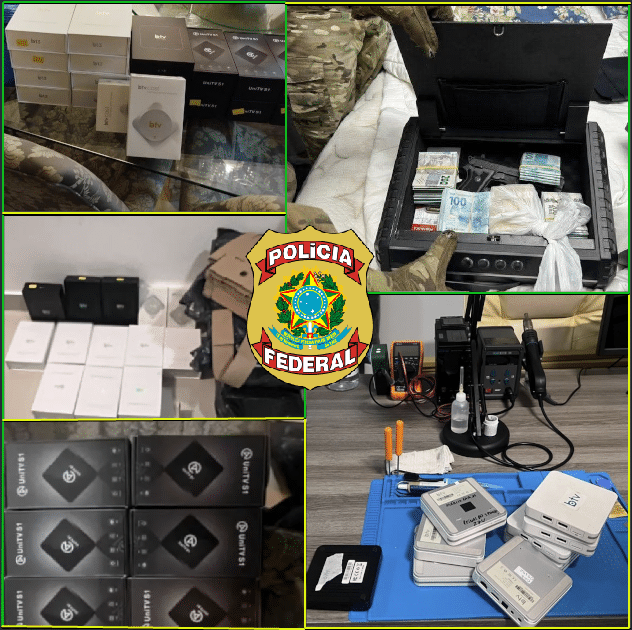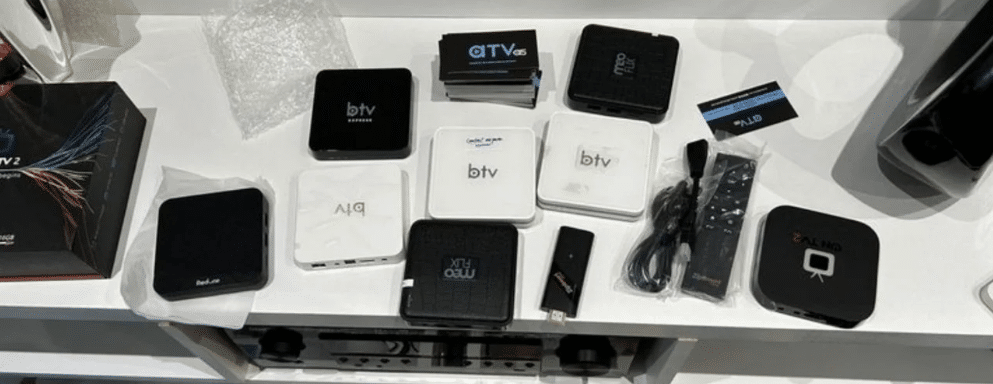 Many countries are currently tackling above average piracy rates, usually with a mix of education, site blocking, civil action, and criminal enforcement, but not necessarily in that order.
Many countries are currently tackling above average piracy rates, usually with a mix of education, site blocking, civil action, and criminal enforcement, but not necessarily in that order.
Typically, members of the public are warned that purchasing a pirate TV box risks fueling organized crime. With the threshold for criminality seemingly lower than ever, they could even step over the line themselves.
Greece, for example, seems intent on criminalizing people who simply watch pirate streams. They risk stiff fines and at least on paper, 12 months in prison. Brazil is nowhere near ready to do that, especially in areas where ISPs and TV companies face threats for attempting to carry out repairs to their own equipment, or whatever remains of it.
Operation Praedo
Better known as Anatel, the National Telecommunications Agency is a financially independent authority tasked with supervising, guiding, and regulating communications in Brazil.
Anatel also decides through a certification process whether set-top boxes can be made available to the public, or destroyed on sight. Even if they carry no pirated content, devices face confiscation for failing electrical safety and other standards; that’s probably one the reasons devices are now being smuggled into the country.
Using the Latin word for ‘pirate’, Federal Police launched Operation Praedo to crack down on the importation, distribution, and sale of illegal TV devices, including the appropriately named ‘TV Box’, a Chinese-manufactured, pre-configured device popular locally.

Last Tuesday, 38 Federal Police officers supported by Anatel agents executed a total of 12 search and seizure warrants, eight in Curitiba, three in Foz do Iguaçu, and one in Brasília.
Precautionary measures issued by the 9th Federal Court of Curitiba ensured that assets worth around US$6 million were frozen, vehicles and real estate were seized, and websites used by the suspects were blocked by ISPs.
Complaint Triggered Investigation
Anatel reports that a complaint from an entity representing the telecommunications sector, led police to a sales website managed by an unnamed couple in Curitiba, who reportedly used shell companies to hide their income.
Police later identified another couple and found that additional family members were also involved, working together to sell the pirate devices throughout Brazil after being smuggled in from neighboring Paraguay.

“The devices entered Brazil clandestinely, coming from the border with Paraguay via Foz do Iguaçu, through smugglers. The merchandise entered without the proper payment of taxes and, as it does not have approval from Anatel, its commercialization is irregular, constituting a crime of smuggling,” Anatel reports.
“The Federal Police identified an organized criminal structure, with a clear division of functions between importers, logistics operators, financial intermediaries and digital merchants. Large financial transactions were detected, incompatible with the declared income of those involved.”
Illicit income for just one of the couples is said to have reached US$91,000; that’s over twelve times the average salary in Brazil at the time of writing, the equivalent of US$7,000 per year. The money appears to have gone a long way; Anatel says the couple acquired real estate, vehicles and luxury items, much or even all of it is likely to have been seized.

The potential charges mentioned by Anatel include copyright infringement, clandestine development of telecommunications, criminal organization, and smuggling.
Anti-Piracy PSAs Released
Discouraging citizens from using pirate set-top boxes in Brazil has been in vogue for some time and for good reason. The country has one of the highest malware infection rates anywhere on the planet, helped along by a toxic mix of cheap, insecure, and uncertified Chinese-manufactured set-top boxes, many of which receive zero security updates.
No access to Google Play means that users have little choice but to obtain APK files from unverified sources. While infection isn’t 100% guaranteed through use of a third-party store, for some it might already be too late. According to reports, some devices arrive infected straight from the factory.
People getting more than they’d bargained for, or less than they were promised, is the theme in three new PSAs released by Anatel recently. All three use humor instead of the well-worn fear factor approach, an interesting choice given that the scale of the problem is no laughing matter. Whether they’ll prove any more effective is unknown, but they seem unlikely to provoke instant pushback, which is something at least.
From: TF, for the latest news on copyright battles, piracy and more.
Powered by WPeMatico
